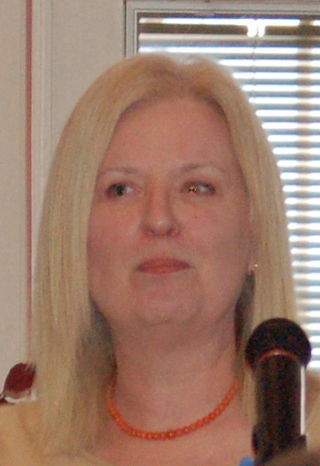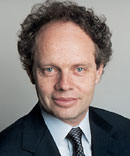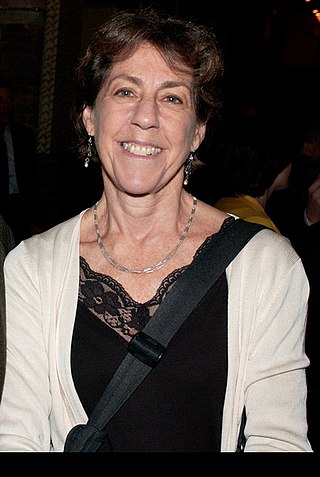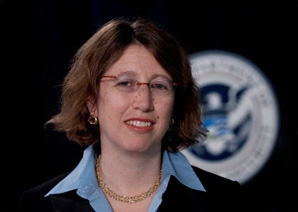
Stanford Law School (SLS) is the law school of Stanford University,a private research university near Palo Alto,California. Established in 1893,Stanford Law had an acceptance rate of 6.28% in 2021,the second-lowest of any law school in the country. George Triantis currently serves as Dean.
Reva B. Siegel is the Nicholas deB. Katzenbach Professor of Law at Yale Law School. Siegel's writing draws on legal history to explore questions of law and inequality,and to analyze how courts interact with representative government and popular movements in interpreting the Constitution. She is currently writing on the role of social movement conflict in guiding constitutional change,addressing this question in recent articles on reproductive rights,originalism and the Second Amendment,the "de facto ERA," and the enforcement of Brown. Her publications include Processes of Constitutional Decisionmaking;The Constitution in 2020;and Directions in Sexual Harassment Law. Professor Siegel received her B.A.,M.Phil,and J.D. from Yale University,clerked for Judge Spottswood William Robinson III on the D.C. Circuit,and began teaching at the University of California at Berkeley. She is a member of the American Academy of Arts and Sciences,and is active in the American Society for Legal History,the Association of American Law Schools,the American Constitution Society,in the national organization and as faculty advisor of Yale's chapter. She was elected to the American Philosophical Society in 2018.

Ann Althouse is an American law professor and blogger.

Samuel Issacharoff is an American legal scholar. His scholarly work focuses on constitutional law,voting rights and civil procedure. He is the Bonnie and Richard Reiss Professor of Constitutional Law at New York University School of Law.

Richard L. Revesz is an American lawyer and academic. He is the administrator of the Office of Information and Regulatory Affairs. During his government employment,he is on leave as the AnBryce Professor of Law at the New York University School of Law. He served as dean of the New York University School of Law from 2002 to 2013,and as the director of the American Law Institute from 2014 to 2023.
David Rudovsky is an American civil rights and criminal defense lawyer. He was a founding partner,in 1971,of the law firm of Kairys &Rudovsky. Rudovsky is a Senior Fellow at University of Pennsylvania Law School,where he teaches evidence and constitutional criminal procedure. In 1996,Rudovsky won Penn's Lindback Award for Teaching Excellence. In 1986 he was named a MacArthur Fellow by the John D. and Catherine T. MacArthur Foundation.

Burt Neuborne is the Norman Dorsen Professor of Civil Liberties at New York University School of Law and the founding legal director of the Brennan Center for Justice.
The Center for Individual Rights (CIR) is a non-profit public interest law firm in the United States. Based in Washington,D.C.,the firm is "dedicated to the defense of individual liberties against the increasingly aggressive and unchecked authority of federal and state governments". The Center is officially nonpartisan. Its work focuses on enforcement of constitutional limits on state and federal power,primarily through litigation.

Marjorie Heins is a First Amendment lawyer,writer and founder of the Free Expression Policy Project.

The Asian American Legal Defense and Education Fund (AALDEF) is a New York-based national organization founded in 1974 that seeks to protect and promote the civil rights of Asian Americans. By combining litigation,advocacy,education,and organizing,AALDEF works with Asian American communities across the country to secure human rights for all.
Stephen Wizner is the William O. Douglas Clinical Professor of Law at Yale Law School. He also has a Special Appointment as the Sackler Professor of Law at Tel Aviv University.
Cynthia Estlund is the Catherine A. Rein Professor of Law at the New York University School of Law.
Northwest Immigrant Rights Project (NWIRP) is a non-profit legal services organization in Washington state. NWIRP's mission is to promote justice by defending and advancing the rights of immigrants through direct legal services,systemic advocacy,and community education.
Gerald P. López is Professor of Law at UCLA School of Law. He is also the author of several influential books about lawyering and law practice.

Vanita Gupta is an American attorney who served as United States Associate Attorney General from April 22,2021,to February 2,2024. From 2014 to 2017,Gupta served as Assistant Attorney General for the Civil Rights Division under President Barack Obama.

Clyde Wilson Summers was an American lawyer and educator who advocated for more democratic procedures in labor unions. He helped write the Labor Management Reporting and Disclosure Act of 1959 and was highly influential in the field of labor law,authoring more than 150 publications on the issue of union democracy alone. He was considered the nation's leading expert on union democracy. "What Louis Brandeis was to the field of privacy law,Clyde Summers is to the field of union democracy," wrote Widener University School of Law professor Michael J. Goldberg in the summer of 2010. "Summers,like Brandeis,provided the theoretical foundation for an important new field of law."

Adam Winkler is the Connell Professor of Law at the UCLA School of Law. He is the author of We the Corporations:How American Businesses Won Their Civil Rights and Gunfight:The Battle over the Right to Bear Arms in America. His work has frequently been cited in judicial opinions,including in Supreme Court cases pertaining to the First and Second Amendments.

Margo Jane Schlanger is a Professor of Law at the University of Michigan Law School,and the founder and director of the Civil Rights Litigation Clearinghouse. Previously,she was at Washington University School of Law. From 2010 to 2012,while on leave from her professorial position,she served as the presidentially-appointed Officer for Civil Rights and Civil Liberties at the United States Department of Homeland Security. As the top civil rights official at the Department of Homeland Security,Schlanger led the office that advises department leadership about civil rights and civil liberties issues,engages with communities whose civil rights and civil liberties may be affected by Department activities,investigates and resolves civil rights complaints,and leads the Departments equal employment opportunity program. Schlanger's major initiatives as Civil Rights and Civil Liberties Officer included:creating and managing a structure for overseeing the Department's controversial Secure Communities program to ensure that it did not serve as a conduit for unconstitutional practices by local law enforcement agencies in jurisdictions covered by the program;publishing guidance for agencies that receive DHS funding on providing meaningful access to people with limited English proficiency;working with U.S. Immigration and Customs Enforcement on the reform of detention practices;and improving the department's civil rights complaint process.
Wolf v. Vidal,591 U.S. ___ (2020),was a case that was filed to challenge the Trump Administration's rescission of Deferred Action for Childhood Arrivals (DACA). Plaintiffs in the case are DACA recipients who argue that the rescission decision is unlawful under the Administrative Procedure Act and the Fifth Amendment. On February 13,2018,Judge Garaufis in the Eastern District of New York addressed the question of whether the government offered a legally adequate reason for ending the DACA program. The court found that Defendants did not provide a legally adequate reason for ending the DACA program and that the decision to end DACA was arbitrary and capricious. Defendants have appealed the decision to the Second Circuit Court of Appeals.
Deborah N. Archer is an American civil rights lawyer and law professor. She is the Jacob K. Javits Professor at New York University and professor of clinical law at New York University School of Law. She also directs the Center on Race,Inequality,and the Law and the Civil Rights Clinic at NYU School of Law. In January 2021,she was elected president of the American Civil Liberties Union,becoming the first African American to hold the position in the organization’s history.










